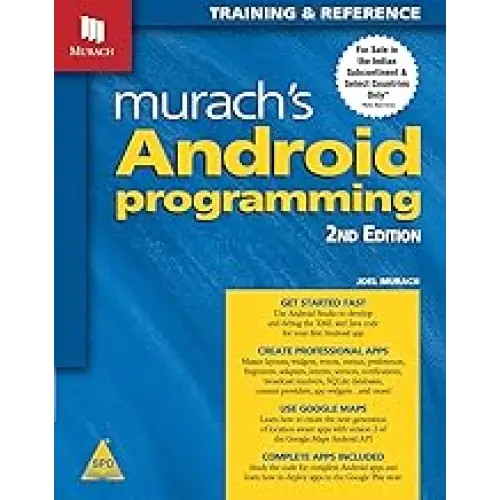BOOKZONE
Murach's Android Programming, 2nd Edition
Paperback
by Joel Murach
SKU:9789352133208
Bulk Discount Get Exta 5% upto 10%
Share

What this book does
This book is a great way to get started with Android programming. Here’s a brief rundown of its sections.
Section 1: Get started fast
In four chapters, you’ll quickly master the basics of Android programming. That includes:
essential concepts and terms for Android programming
how to use Android Studio to develop your first Android app, a simple but complete Tip Calculator app
how to use Android Studio to thoroughly test and debug your apps
Section 2: The essential Android skills
You’ll learn the Android essentials by enhancing the Tip Calculator app that you developed in section 1. Those essentials include:
how to use layouts and widgets to develop a sophisticated user interface
how to handle high- and low-level events
how to use themes and styles to format your app in a way that’s consistent and easy to maintain
how to use menus and preferences
how to use fragments to take advantage of the large screens that are available on devices like tablets
Section 3: The News Reader app
You’ll learn how to develop a News Reader app that displays current news to the user. Along the way, you’ll learn:
how to read an RSS feed from the Internet, save that data in a file, and display it on the user interface
how to use a service to download data for an app even when the app isn’t running
how to notify a user that new data is available even when the app isn’t the current app
how to respond to actions that are broadcast by the Android operating system or by other apps
Section 4: The Task List app
You’ll learn how develop a Task List app that stores one or more to-do lists. Along the way, you’ll learn:
how to create a database and use it to store data
how to use tabs and a custom adapter to display data on the user interface
how to use a content provider to allow other apps to work with the same data as this app
how to create an app widget that can display some of this app’s data on a device’s Home screen
Section 5: Advanced Android skills
You’ll learn some advanced skills for developing and deploying apps including:
how to create a Run Tracker app that tracks the location of a device on a Google Map
how to deploy apps to the Google Play store
Who this book is for
This book is for anyone who wants to learn professional skills for developing Android apps. The only prerequisite is a basic understanding of Java, roughly equivalent to chapters 1 through 18 of Murach's Beginning Java with NetBeans or Murach's Beginning Java with Eclipse. Once you have those Java skills, our Android book will work for you, even if you have absolutely no experience developing mobile apps.
What software you need
You can download all of the software that you need for this book for free from the Internet:
the Java SDK (Software Development Kit)
Android Studio, which includes the Android SDK
Appendixes A, B, and C show how to install and configure this software on Windows, Mac OS X, and Linux.
What hardware we recommend
If necessary, you can use an emulator to run and test Android apps; this book shows you how. Unfortunately, emulators tend to run extremely slowly on most computers. As a result, we recommend using an actual Android device such as a smartphone or tablet whenever possible.
What software this book supports
What version of Android this book supports
Over 95% of all Android devices use Android 4.0 (API 15) or later, and this book reflects that. The only app that won’t work with Android 4.0 is the News Reader app, which is designed to work with Android 4.1 (API 16) and later.
At the time this book was written, the most recent release was Android 6.0 (API 23). But since Android is backwards-compatible, all of the apps will continue to work under subsequent releases, too.


